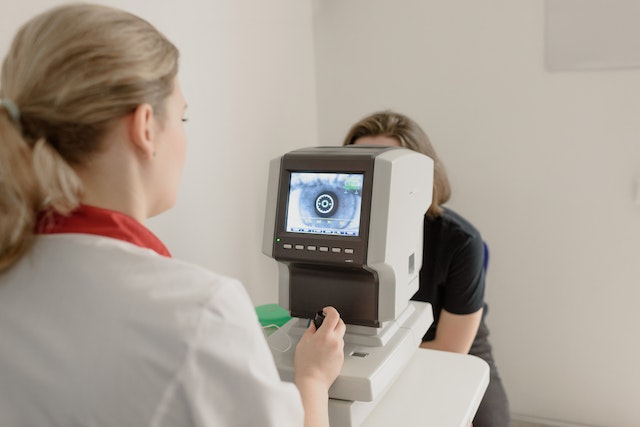Your first LASIK procedure went smoothly, and you were delighted with the results. What person wouldn’t be? Your life became easier once you no longer had to wear glasses or contacts.
Life-changing procedures like LASIK aren’t always permanent. Although LASIK provides the benefit of not wearing glasses or contacts, what happens after the procedure? Going back to a life centered around contacts or glasses is fine. The question then arises, “Can you get Lasik twice?”.
Femtosecond lasers generate thinner and more reproducible flaps than bladed keratomes of 15-20 years ago, one of the advantages of laser LASIK. By sculpting more tissue underneath the LASIK flap, the procedure is safer, and LASIK can be performed at higher prescriptions.
LASIK Surgery and Vision Changes
LASIK patients should be aware that their vision may change after the procedure. Many reasons can lead to changes in vision after LASIK.
Once LASIK is performed, most patients need no further treatment. LASIK does not guarantee a lifetime of clear vision, and this procedure aims to provide long-term vision correction, which can last a lifetime for some patients after LASIK.
After LASIK, patients with changing vision may undergo LASIK again if their vision has changed. Contacting the practice that performed the original procedure is the first step, and you must schedule another LASIK consultation.
The second procedure will only be performed if it is necessary by your surgeon. The same factors apply when you get LASIK a second time as when you get it the first time. Various factors, such as age and eye health, can contribute to these conditions.
A possible second LASIK procedure
LASIK is an effective and long-lasting procedure that millions have enjoyed. Despite this, LASIK does not fix all vision problems. Refractive errors can be corrected with LASIK by reshaping the cornea. Presbyopia or cataracts can occur even after LASIK, and LASIK does not touch these areas of the cornea or affect them in any way.
As early as 40, many vision changes are caused by aging. Cataracts and glaucoma are often not noticed by people. LASIK may need to be repeated if refractive errors are not corrected. It will be necessary to create another flap if a second operation is needed. Most second LASIK procedures are performed after five to ten years.
Enhancements to LASIK
Enhancements are needed for two reasons. After the initial laser, the laser did not get them completely, and I do this about 1% of the time when we need to tweak residual astigmatism or nearsightedness. Secondly, the laser may be off target, and the patient needs enhancement. In other words, “the laser missed the mark.”
We can touch up astigmatism and nearsightedness many years after the eyes shift slightly. The risk of needing more laser eye surgery is about 1% per year. The vision of someone who needs an enhancement is usually 20/40 or better, which is good enough for driving tests but blurry enough that someone needs to squint to see faces at a distance. Although imperfect, it’s usually 90 to 95% better than before LASIK.
As a result of Lasik in 1998, I have a near-perfect vision at a distance (I had -8, very nearsighted, with one diopter of astigmatism roughly in both eyes). My reading glasses help me see up close, but I only need them as I am older than 45. As a rule, this happens.
Due to our lifespan and vision milestones, we will likely see a few people needing multiple enhancements. If someone gets LASIK at 25, then needs an enhancement at 39, the next major changes would be the same regardless of their need for glasses or LASIK. Presbyopia and cataracts will affect all of us no matter what type of laser eye surgery we have received. Our eyes go through certain milestones in their development. Among them are:
Ocular maturity:
Our glasses prescription stabilizes between 18 and 22 after we reach ocular maturity.
Presbyopia:
around 45, our lens loses its flexibility to the point where we need glasses – either for near vision or distance vision.
Lens dysfunction/cataract:
When our eye lens becomes less clear and requires cataract surgery, this occurs around the age of 60 and up.
LASIK isn’t the problem; it’s your aging eyes
Most LASIK patients do not experience vision problems due to the procedure later in life, and as they age, their eyes change. Cataracts gradually reduce patients’ vision and clarity as they develop, and Cataract surgery is the only true solution to cataracts.
LASIK cannot help a patient with cataracts who needs a second procedure. A cataract affects the eye’s natural lens, whereas LASIK reshapes the cornea. Lenses are separate components of the eye. A premium IOL may be the best option for patients looking to regain clear vision after LASIK!
Presbyopia is another way in which the eyes change with age. During presbyopia, the eyes lose their ability to focus naturally. The reason why many people over 40 wear reading glasses is because of this. Patients with presbyopia would not benefit from LASIK twice if they had cataracts. As we age, our eyes’ lenses become thicker and less flexible. LASIK cannot correct presbyopia vision problems, as it cannot correct cataracts.
Cells and organic materials make up our bodies, and our eyes also age like the rest of our bodies. For most patients, the question is: “Can I stay out of glasses for the rest of my life?” Thanks to modern technology, the answer is: “Almost entirely.”
Hopefully, presbyopia treatments will improve in the coming years, and cataracts can be treated superbly. By having LASIK, PRK, or ICL treatment for nearsightedness, young adults can also avoid glasses until presbyopia.




